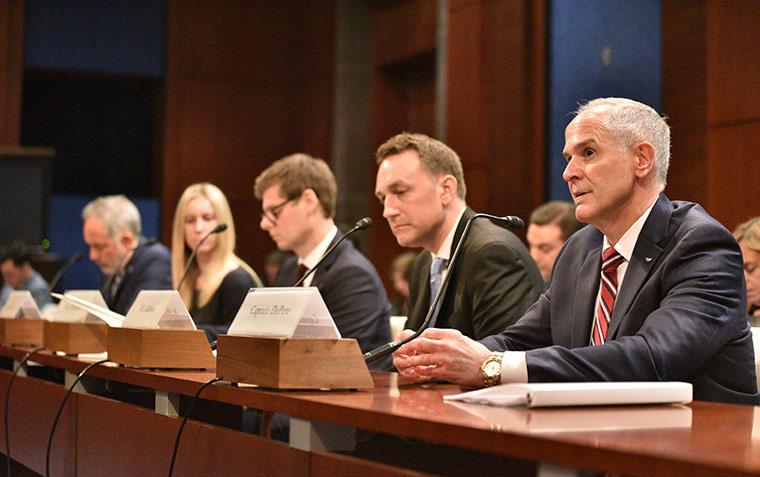From the Hill: ALPA President Testifies Before Congress on Safety and Innovation in Aviation
By John Perkinson, Senior Staff Writer

Capt. Joe DePete, ALPA’s president, far right, testifies before the Aviation Subcommittee of the U.S. House of Representatives Committee on Transportation and Infrastructure on safety and innovation in aviation.
“Expanded markets and technical advancements are creating exciting developments in aviation,” said Capt. Joe DePete, ALPA’s president, in testimony to members of the Aviation Subcommittee of the U.S. House of Representatives Committee on Transportation and Infrastructure. “When it comes to integrating new types of operations into the national airspace, we have the opportunity to do it right the first time.”
ALPA’s president was one of five panelists asked to speak on March 12 at a hearing titled “Looking Forward: Aviation 2050” to examine the future of aviation and the national airspace system (NAS). In addition to airline travel, panelists discussed new aviation and aerospace technologies, including passenger air taxis, commercial space transportation, and supersonic aircraft and how these new entrants will affect the NAS.
“As head of the world’s largest nongovernmental aviation safety organization, I can tell you that maintaining one level of safety throughout the national airspace is essential to fostering the innovation of tomorrow,” DePete asserted. In written testimony he submitted separately to the subcommittee, DePete attributed the airline industry’s remarkable safety record, in large part, to two important actions: predictive risk analysis and the FAA Authorization Extension Act of 2010.
The predictive risk analysis conducted by the Commercial Aviation Safety Team (CAST) and Aviation Safety and Information Analysis and Sharing (ASIAS) examines pilot and other data submitted through nonpunitive voluntary reporting systems and applies it to help minimize operational risks. The FAA Authorization Extension Act of 2010 and its numerous safety measures included the requirement to train pilots in upset prevention and recovery.
DePete emphasized to the federal lawmakers gathered that aviation agencies must be given the resources they need to innovate through programs such as NextGen. He also addressed the disruption created by the government shutdown earlier this year and its detrimental effect on the FAA’s and the TSA’s services and programs.
ALPA’s president affirmed that the Association is committed to collaborating with all who work within the NAS to ensure its safety. He stated, “As we consider aviation in 2050, we have an opportunity to innovate not only how we use our national airspace but also how we keep it safe. Together, we can protect what’s most important to us all—our passengers, participants, crews, and cargo.”
In addition to presenting opening statements, panelists also had the chance to take questions from Members of Congress. Talking about future industry demands, Rep. Troy Balderson (R-OH) said, “We have an expected need of 790,000 pilots by 2037. What is there for Congress to do to address this issue?” DePete acknowledged that the industry needs to do all it can to continue to attract future pilots. He also stated that lawmakers need to protect U.S. airlines and their employees from unfair foreign competition, including heavily subsidized airlines, flag-of-convenience business models, and atypical employment practices.
With developments in technology, Rep. Angie Craig (D-MN) asked how the role of pilots might shift in future airline operations. DePete was quick to point out the importance of the presence of at least two highly qualified and well-rested pilots in the cockpit. As an example, he referenced the Jan. 14, 2017, Delta Air Lines flight from Tokyo, Japan, to Portland, Ore., that was forced to divert to remote Cold Bay, Alaska, due to a mechanical concern. The pilots were compelled to make numerous decisions both in the air and on the ground to keep their 210 passengers and 11 crewmembers safe and unharmed.
Rep. John Katko (R-NY) raised concerns about the threat of cybersecurity, unmanned aircraft systems, and their ability to be “weaponized.” DePete identified the need for an appropriate recognition and response mechanism, but also cited the need for continuous funding streams for the FAA to invest in this kind of program and to ensure it would remain available during future government shutdowns.

